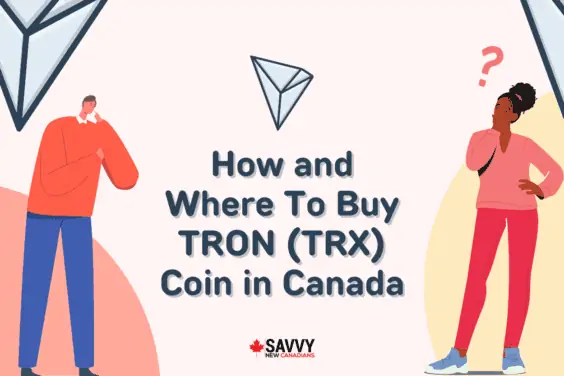If you have been looking for ways to add Bitcoin to your investment portfolio without worrying about cold wallets and public keys, a Bitcoin Exchange Traded Fund (ETF) may work for you.
Canadians invented the first-ever ETF, and Canada has been at the forefront of approving the first Bitcoin ETFs in North America as well.
Cryptocurrencies took centre stage a few years ago, with digital currencies like Bitcoin breaking inconceivable price records.
While this asset class is relatively new and highly volatile, investors’ appetite for them and their risks appear unabated.
This post covers the five best Bitcoin ETFs currently available on the Toronto Stock Exchange (TSX).
Related: How To Trade Bitcoin in Canada
Best Canadian Bitcoin ETFs
The first North American Bitcoin ETF, the Purpose Bitcoin ETF, launched on February 18, 2021.
Four others have launched since then:
- Evolve Bitcoin ETF (EBIT)
- CI Galaxy Bitcoin ETF (BTCX)
- 3iQ CoinShares Bitcoin ETF (BTCQ)
- Ninepoint Bitcoin ETF (BITC)
1. Purpose Bitcoin ETF (BTCC)
BTCC is Purpose Investment’s crypto ETF offering investors exposure to the world’s most popular cryptocurrency.
It is traded on the TSX under three ticker symbols as follows:
- BTCC (CAD and currency-hedged)
- BTCC.B (CAD and non-currency hedged)
- BTCC.U (USD and non-currency hedged)
Below are some key details about the Purpose Bitcoin ETF as of July 21, 2023:
- Inception date: February 18, 2021
- Assets under management: $1.1 billion (CAD)
- Number of Bitcoin: 28435.629699
- Management fee: 1.00%
- Eligible accounts: TFSA, RRSP, personal and corporate non-registered investment accounts
- Listing currency: CAD & USD
- Cold storage wallet: 100%
- Hot storage wallet: 0%
- Eligible for DRIP and PACC
BTCC Fees and Returns
This ETF (non-FX hedged) had a 56.22% return over the last year as of June 30, 2023.
It has a 1.00% management fee that is significantly higher than some of the other Bitcoin ETFs on this list.
How To Buy Purpose Bitcoin ETF in Canada
Investors can purchase Purpose Bitcoin ETF on popular brokerage platforms like Wealthsimple Trade and Questrade.
Wealthsimple Trade

Trade stocks, ETFs, and options
Excellent trading platform for beginners
Deposit $150+ to get a $25 cash bonus
Transfer fees waived up to $150
Questrade offers no-commission trading for ETFs and a $50 bonus when you fund your account with at least $1,000.
2. Evolve Bitcoin ETF (EBIT)
Evolve Bitcoin ETF provides investors with a practical way to invest directly in Bitcoin using a brokerage account.
It is traded on the TSX under two ticker symbols:
- EBIT (CAD, unhedged)
- EBIT.U (USD)
Key facts about EBIT as of July 21, 2023, include:
- Inception date: February 19, 2021
- Assets under management: $110 million (CAD)
- Management: 0.75%
- Price Index: CME CF Bitcoin Reference Rate (BRR)
- BTC per share: 0.00036599
- Eligible accounts: TFSA, RRPS, personal and business taxable accounts
- Listing currency: CAD & USD
- Cold storage wallet: 100%
EBIT Fees and Returns
The return for EBIT so far this year is 74.23% (as of June 30th). Since its inception, it has returned -20.90%. Also, its distribution frequency will occur annually if applicable.
EBIT has a management fee of 0.75%.
How To Buy Evolve Bitcoin ETF in Canada
You can purchase EBIT using a self-directed brokerage account. Brokerage platforms offering it in Canada include:
Wealthsimple Trade: Offers free ETF and stock purchases. Plus, a $25 bonus with a $150 deposit.
Questrade: Offers free EBIT purchases. New clients get $50 in free trades using our referral link.
Related: Bitcoin Trading Apps in Canada.
3. CI Galaxy Bitcoin ETF (BTCX)
The third Bitcoin ETF in Canada is CI Galaxy Bitcoin ETF.
This ETF is managed by CI Investments in partnership with Galaxy Digital Capital Management.
BTCX is traded on the Toronto Stock Exchange under the ticker symbols:
- BTCX.B (CAD and unhedged)
- BTCX.U (USD)
The key fund details for this ETF as of July 21, 2023, are:
- Inception date: March 5, 2021
- Assets under management: $279 million
- Management fee: 0.40%
- BTC per unit: 0.000149
- Eligible accounts: RRSP, RRIF, TFSA, RESP, RDSP, DPSP, personal and corporate mon-registered accounts
- Cold wallet storage: 100%
- Listing currency: CAD & USD
BTCX Fees and Returns
BTCX has the lowest management fee of all the Bitcoin ETFs in Canada, at 0.40%.
The returns for BTCX since its inception is -19.9%, and it is up 79.2% in 2023 as of June 30, 2023.
How To Buy BTCX
BTCX is traded on the TSX and is available through all the major brokerage platforms.
You should always keep in mind that this class of assets is very risky, and you can lose some or all of your investment.
3iQ and CoinShares partnered to offer Canada’s fourth Bitcoin ETF, 3iQ CoinShares Bitcoin ETF (BTCQ).
It is traded on the TSX under two ticker symbols:
- BTCQ (CAD and non-currency unhedged)
- BTCQ.U (USD and non-currency unhedged)
Key details for BTCQ are:
- Inception date: March 31, 2021
- Assets under management: $104 million (CAD)
- Management fee: 1.00% (MER up to 1.33%)
- Eligible accounts: RRSP, RRIF, RDSP, DPSP, RESP, TFSA, personal and corporate non-registered investment accounts
- Listing currency: CAD & USD
- Cold storage wallet: 100%
BTCQ Fees and Returns
As of this writing, BTCQ has a 1.00% management fee, and its 12-month rolling average MER is 1.33%.
BTCQ’s return so far in 2023 is 77.96% (June 2023).
How To Buy BTCQ
BTCQ and BTCQ.U are available on Questrade and Wealthsimple Trade.
You can also purchase it on brokerage platforms owned by big banks like TD Direct Investing and Scotia iTrade.
5. NinePoint Bitcoin ETF (BITC)
This Bitcoin ETF is available in Canadian and U.S. dollars.
Its key details as of January 13, 2023, include:
- Inception date (Series A & F): January 5, 2022
- BTC per unit: 0.000292993
- Management fee: 0.70%
- Eligible accounts: RRSP, RRIF, RDSP, DPSP, RESP, TFSA, non-registered accounts
Ninepoint will use part of its management fee to offset the carbon produced by the Bitcoin held in BITC.
Pros of Bitcoin ETFs
Bitcoin ETFs are easier to purchase and hold than buying Bitcoin directly online. With an ETF, you don’t need to worry about securing your keys or digital wallets.
All three funds secure their Bitcoin holdings offline in cold storage, so it is ‘protected’ from online hacking/theft.
Unlike the digital currency itself, you can hold a Bitcoin ETF in a registered account (e.g. RRSP & TFSA).
Lastly, when you buy this ETF, you are investing directly in bitcoin, and your investment returns will track the price action of the asset itself.
Cons of Bitcoin ETFs
Bitcoin investing is not appropriate for investors who are not willing to take the risk that they could lose all their investments.
The security is very volatile and experiences intra-day price swings that are not for the faint of heart.
Bitcoin ETFs charge management fees in addition to the brokerage fees you incur if you are not using a no-commission broker.
You can potentially avoid paying a management fee if you purchase Bitcoin directly on a crypto exchange like CoinSmart, NDAX, or Wealthsimple Crypto.
If your main interest in Bitcoin is its decentralized system of transactions, that benefit is lost following its packaging as an ETF.
You can’t use your Bitcoin holding within an ETF to complete peer-to-peer transactions. And after you sell your ETF holdings, you are left with fiat.
How To Buy and Hold Bitcoin Directly in Canada
Now that you have read the pros and cons of buying a Bitcoin ETF and purchasing bitcoin directly, the table below shows some of the popular cryptocurrency exchanges you can use to purchase BTC if that’s your preference:
| Features | CoinSmart | Wealthsimple Crypto | NDAX | Bitbuy |
| Coins Offered | BTC, ETH, LTC, XRP, USDT, BCH, XLM, ADA, EOS, NEO, UNI, USDC, DOT, MATIC, etc. (Now Bitbuy) | BTC, ETH, DOGE, AAVE, BAT, COMP, LTC, BAL, LINK, CRV, KNC, MKR, SNX, UNI, YFI, & others | BTC, ETH, XLM, LTC, EOS, LINK, USDT, DOGE, ADA, XRP, UNI, COMP, DOT, & others | BTC, ETH, LTC, BCH, XLM, EOS, AAVE, etc. |
| Funding options | Interac e-Transfer, bank wire, bank draft, credit/debit card | Electronic fund transfer | Interac e-Transfer, bank draft, and bank wire | Interac e-Transfer; bank wire |
| Fees | Competitive trading fees; some on deposits/withdrawals | 1.5% trading fee; no commission on deposits and withdrawals | 0.20% trading fee; flat-rate fee for withdrawals | 0% to 2% trading fees |
| CIPF/CDIC insurance | No | No | No | No |
| Security | 95% cold storage; 2FA | Coin held with a regulated custodian – Gemini | 95% cold storage, 2FA | 95% cold storage; 2FA |
| Referral program | Yes – $50 when you deposit an initial $250 | Yes – $25 when you deposit at least $150 | – | – |
| Learn more | Visit | Review | Review | Review |
Conclusion
Investors can also gain exposure to Bitcoin using 3iQ’s QBTC fund. Also referred to as The Bitcoin Fund, QBTC is a closed-end fund that was launched on April 9, 2020.
Its specs as of January 2023 are:
- Ticker: QBTC.U and QBTC
- Net asset value: $218 million (QBTC)
- Management fee: 1.95%
- Eligible accounts: RRSP, TFSA, RRIF, RDSP, DPSP, RESP, personal and corporate taxable accounts.
QBTC is also available for purchase on Questrade and Wealthsimple Trade (only QBTC.U).
Bitcoin ETF Canada FAQs
It depends on your comfort level when buying bitcoin directly from an exchange and using hardware wallets. If you want hassle-free exposure to bitcoin, the ETF requires less work on your part.
All four bitcoin ETFs listed above are designed to invest 100% in the physical bitcoin asset, and there are no obvious differences in their investment strategies at this time. Using the management fees and associated costs, the best bitcoin ETF for me is CI Galaxy Bitcoin ETF with its 0.40% fee.
Other content relating to cryptocurrency trading:





Did you guys see the that Dogecoin is at an all time high? Mark Cuban was talking about it CNBC. Do you guys think it will ever be worth as much as Bitcoin? Did you guys buy any Dogecoin?
Welp, I guess Musk isn’t too interested in Bitcoin anymore. His tweets about Tesla’s BTC have been affecting the market substantially. I need to jump on Coinbase and check everything out. I really wish Musk would stop messing with the market.
if the canadian dollar crashes will the etf or the physical coin perform any differently from one another
@Alex: Good question. I don’t think anyone knows. Bitcoin maximalists posit that Bitcoin is an inflation hedge, etc. Available data does not confirm or disprove this as far as I am aware at the mo.
Hello Enoch, Purpose seems to have two flavours of bitcoin ETF. One is designated as currency hedged, and the other as unhedged. I am able to guess what this means, but I have not found a good explanation after searching online. Do you have any insight into the difference and what the pros/cons are for each? By the way, I have recently found your website. Thanks for sharing your knowledge. This is a tremendous contribution to the Canadian community of people putting effort into managing their personal finances. really well done!
@Alan: Thanks for your feedback – I appreciate it!
With regards to the hedged and unhedged versions of BTCC, here’s how I understand it:
– CAD and currency hedged: Bitcoin’s price is in USD. When the fund buys bitcoin in Canadian dollars, they hedge their position so that changes in the CAD-USD currencies do not significantly impact your returns (i.e. no significant deviations from the market return generated by Bitcoin as a result of currency exchange fluctuations).
– USD and non-currency hedged: This version of the fund will buy bitcoin in USD and relative to the USD example I used above, there is no longer a need to hedge it to USD since it is already denominated in US dollars. You will need to pay USD to buy the fund.
– CAD and unhedged: This version is like the first one (purchased in CAD), however, there is no hedge to protect it from CAD-USD currency fluctuations. There may be some slippage in returns if the USD performs better than CAD (i.e. CAD devalues against the USD). You could also potentially get a higher return if CAD performs better against USD over time.
Hedging removes uncertainties relating to how the two different currencies perform against each other. I hope this helps.
FYI The first ETF was the 3iQ (may 2020) https://3iq.ca/the-bitcoin-fund-qbtcu-qbtc/